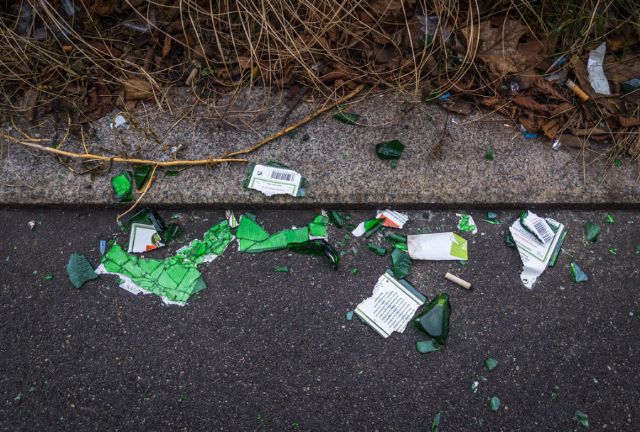Broken glass on the way to work
The other day on the way to D.C.’s Metro, I watched fellow commuters navigating some smashed glass on the crosswalk from the bus. It appeared some people had a drinking party last night and decided shattering was the best method of bottle disposal.
Their faces were surprised. Circumnavigating shards of glass was not part of their usual morning routine.
Having worked in New York City during the decline of David Dinkins, I wasn’t. Then it struck me. They didn’t have that experience.
They live, as I do, in Washington’s tony suburbs, woke places that over the past quarter-century turned Virginia a darker shade of blue. It’s one of the places where the genii who dream up federal policies go to sleep at night.
The folks pride themselves on progressive views: Virginia Democrats can count on Fairfax and the neighboring People’s Republic of Arlington to deliver a solid blue vote against those downstate deplorables that might make Virginia conservative. Beating breasts over civil rights from more than half a century ago, they make sure property taxes and zoning regulations ensure an effective barrier against real “diversity” in the town. They “welcome” children but don pussy hats every January to march for prenatal slaughter. The school board protested Governor Glenn Youngkin’s model policy requiring use of no other than a child’s legal name without parental approval.
Go to local traffic court to watch the game of “don’t ask, don’t tell, definitely don’t do anything.” Local police ticketed their fair share of drivers, in the course of which they discovered the really “undocumented.” No license, no insurance. Those indica don’t get ICE involved with illegal aliens. No! The proper response was a lecture by the judge, ending with the illegal promising not to do it again and paying the ticket. Everybody’s happy: the woke jurisdiction, the city treasurer, the illegal who needs to drive back to work. Only the law-abiding citizen he might hit is advised: driver beware!
So, why should my fellows then be surprised at glass shards on their way to work?
Because exponents of progressivism usually don’t have to cope with its consequences. They can play at the edges, enjoying the frisson of a bit of “transgressiveness” but really don’t immerse themselves in it the same way elegiac hillbillies with a lesser sense of self-control do. Those problems are on the other side of the Blue Ridge.
Running into glass shards perhaps suggests the problems might be closer than you think.
James Wilson and George Kelling spoke of the “broken windows” theory. In a good neighborhood -- one with standards (cultural, ethical, whatever) -- one broken window sticks out, calling to be fixed. But, in an unhealthy environment, the owner doesn’t care and, soon neither do others. The broken window becomes the norm and the environment of that neighborhood mirrors equally declining standards.
1990s New York reversed the Dinkins decline by applying “broken window” policing. When police started arresting subway turnstile jumpers and squeegee guys (who soaped your window at an intersection and demanded payment for their unsolicited “cleaning”), the rap sheets of these low-level hoods revealed they weren’t just low-level. Eventually, crime rates fell. Times Square even became “family friendly” again.
Then came the woke Left and Soros prosecutors who -- like the Democrats’ unelected presidential nominee -- decided to “reimagine” crime. Instead of going after criminals, they go after “root causes” (usually with your tax dollars). Current crime rates demonstrate the utility of this approach.
In the end, the appearance of a bit of consternation on my fellow commuters’ faces gave me a bit of Schadenfreude. That glass was an augury of “broken windows.” Their consternation suggested some vestigial recognition that the broken glass might be more than a nuisance. It could be a warning of what can come if this path not be deviated from may very well be an issue of tolerance: glass shards one day are a bother, glass shards every day is a problem. And whether those commuters -- not unlike the broader electorate -- choose to draw any bigger conclusions is another question, too.

Image: Ivan Radic





